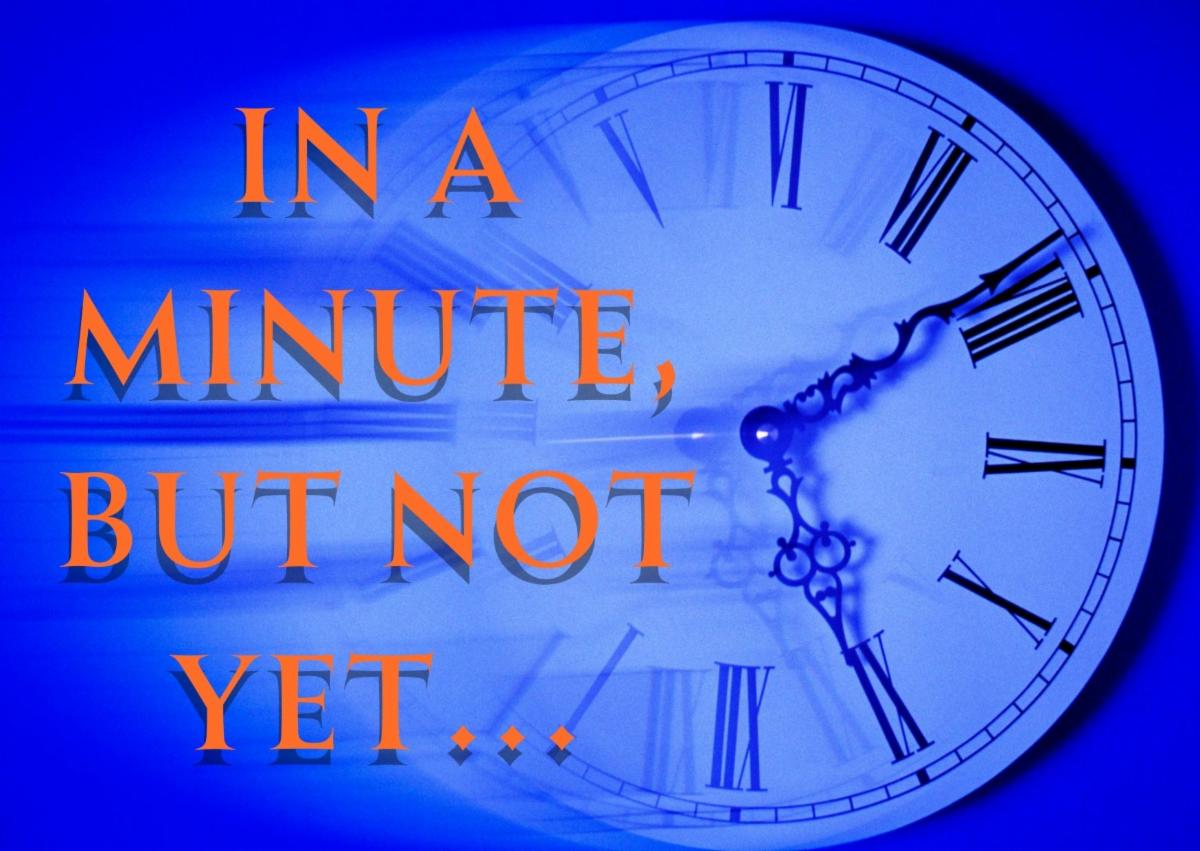Illnesses

Bowl of Soup

I love autumn and winter for many reasons, but one of my favorite reasons is that I get to eat soups. Call me strange, but I like soup, although it is not fun to eat when it is 110 degrees outside. Amanda makes some dynamite soups, and I can’t wait for cooler weather to roll in so that the soups can come out. There is an ongoing debate that Amanda and I have with some of our old friends. Is soup a meal?
In a Minute, but Not Yet…

Me on His Mind

Every autumn, something spectacular happens as the weather changes and the shifting sun in the northern hemisphere shortens our daylight hours. Trees stop producing chlorophyll as they prepare to go dormant during the colder winter months. On the surface, it is simply the process of biological systems marching on and charting their course. Yet there is an element that is lost using only biological processes… it is beautiful to behold. Few things are as
enchanting as the leaves of trees changing colors. People will travel vast distances to see the leaves change in the Fall; they say the trees in Vermont, New Hampshire, and Maine are amazing this time of year. And yet, with all of the hullabaloo surrounding the changing of the
trees, there is no consensus in the scientific community for why it is a process that happens, merely that it does.
According to Earth.com and Harvard Forest, there are various reasons why the leaves might change colors. They list it as anything from Leaf Camouflage, Fruit Flag, Leaf Apparency, or Avoiding Camouflage. Still, in my estimation, each of these hypotheses fails to answer the
question of “Why?” Their theories contradict each other. Is it a warning to avoid that tree or to attract animals to their fruit? Take maple trees and their beautiful red leaves, for example: do they change colors to attract insects to their sugary sap (this seems counterproductive for a tree going dormant), or are they warning animals to avoid them (which would harm their ability to scatter seeds.) They state that these could be reasons, but there is no agreement or, in my opinion, a satisfactory justification for the process.
Perhaps I am being anthropocentric, focusing on this from a human perspective, but this process is delightful to the eyes. It seems God has created this unique and fantastic occurrence for us to enjoy. Leaves could turn brown and fall to the ground, yet they change to these gorgeous hues, and we are the delighted beneficiaries. What would the changing of the season be like if we were plunged into drab winter without this display of vibrancy each Fall? It highlights the march of time with one final blaze of glory before the cold, dreary months. And I love it!
When Paul and Barnabas were in Lystra, they shared this observance and discourse with the Hellenized region of modern-day Turkey, stating:
Men, why are you doing these things? We are also men of the same nature as you, preaching the gospel to you, to turn from these useless things to a living God, who MADE THE HEAVEN AND THE EARTH AND THE SEA, AND EVERYTHING THAT IS IN THEM. 16 In past generations He permitted all the nations to go their ways; 17 yet He did not leave Himself without witness, in that He did good and gave you rains from heaven and fruitful seasons, satisfying your hearts with food and gladness. (Acts 14:15-17 NASB20).
The crowd is trying to worship Barnabas and Paul for healing a man who was lame from birth. They both used the opportunity to set the narrative straight as they were merely instruments of God. Yet what they say is important for us to note. Essentially, they reason that God, who made everything, also made many of these things purely for our enjoyment. The rains and harvests are to bring us food and fill our hearts with gladness. It is a tenant of our beliefs that God created everything we see with humanity in mind. The thought that God created the entire world and then set humanity as the pinnacle of that creation. The Bible spells this out for us from the beginning. These principles ground us with the notion that God has orchestrated everything from creation to salvation with Me on His Mind.
I Trust You, Use Me

Judges 6:36-40 – “Then Gideon said to God, “If You are going to save Israel through me, as You have spoken, 37 behold, I am putting a fleece of wool on the threshing floor. If there is dew on the fleece only, and it is dry on all the ground, then I will know that You will save Israel through me, as You have spoken.” 38 And it was so. When he got up early the next morning and wrung out the fleece, he wrung the dew from the fleece, a bowl full of water. 39 Then Gideon said to God, “Do not let Your anger burn against me, so that I may speak only one [more] time; please let me put [You] to the test only one [more] time with the fleece: let it now be dry only on the fleece, and let there be dew on all the ground.” 40 And God did so that night; for it was dry only on the fleece, and dew was on all the ground.”
“I AM with you”

Part of the Process

Trust

Yesterday, in our marriage class, we discovered trust is the basis for any solid relationship. When you are young and infatuated, you will pursue that relationship with an excess of unearned trust. In other words, we interpret that budding relationship through “rose-colored glasses.” That infatuation will last for a while; however, we eventually begin to see our partners for who they are: flawed and human.
That is the interesting thing about relationships. Whether we recognize it or not, we are continually comparing the people in our lives to the standard of whether they will or have betrayed our trust in the past. Suppose someone has continuously let you down. You are more reluctant to believe they won’t betray your confidence in the future. When someone breaks our trust, it may seem insignificant; however, day after day, those minor disappointments add up, and we hesitate to allow others unfettered access to our hearts and lives.
Because we are human, we will fail; that is a given reality: we are not perfect. Therefore, we must augment our failures with repentance and make amends for our mistakes in our relationships. If I told Amanda I would take out the trash and then forget to do this, it would violate the trust she placed in me. To counteract this lapse in character, I need to apologize, and then the next time, I need to follow through on what I say. Although this may be a simple and straightforward example, it is one that we should be aware of. Even the little things add up over time, and we should constantly be willing to bolster the areas where we have fallen short.
This is far different than the relationship that we have with God. In human relationships, we know that it is two flawed people living in association with each other- we operate on the assumption that over time, both of us will fail, and we account for those errors. The Bible presents us with a God demonstrated as a Rock that cannot be moved, and while everything else will crumble around us, including our most intimate of relationships, He never will. Therefore, Jesus gives us these comforting words.
Matthew 7:24-29 – “Therefore, everyone who hears these words of Mine, and acts on them, will be like a wise man who built his house on the rock. 25 “And the rain fell and the floods came, and the winds blew and slammed against that house; and [yet] it did not fall, for it had been founded on the rock. 26 “And everyone who hears these words of Mine, and does not act on them, will be like a foolish man who built his house on the sand. 27 “And the rain fell, and the floods came, and the winds blew and slammed against that house, and it fell–and its collapse was great.” 28 When Jesus had finished these words, the crowds were amazed at His teaching; 29 for He was teaching them as one who had authority, and not as their scribes.”
There is only One on which we can base our entire lives. Everything else will fail us at some point. People, Possessions, and Power are all untrustworthy. We might try to prop them up as if they have any potential to rescue or save us, but we ultimately know the reality. They will let us down, break our trust, and ruin our lives. However, God never will leave us, not forsake us (Deuteronomy 31:8, Hebrews 13:5). His word is a Rock that can sustain us even in the harshest storms. God never has failed, and He never will. And therefore, we can build our lives around Him and His Word. We can also say in confidence that we have God we can trust.
Power Move

1 Corinthians 13:11- “When I was a child, I used to speak like a child, think like a child, reason like a child; when I became a man, I did away with childish things.
1 Corinthians 14:20 – “Brothers and sisters, do not be children in your thinking; yet in evil be infants, but in your thinking be mature.”
1 Corinthians 13:12-13 – “For now we see in a mirror dimly, but then face to face; now I know in part, but then I will know fully, just as I also have been fully known. 13 But now faith, hope, and love remain, these three; but the greatest of these is love.”
1 Corinthians 14:26 – “What is the outcome then, brothers and sisters? When you assemble, each one has a psalm, has a teaching, has a revelation, has a tongue, has an interpretation. All things are to be done for edification.”
Carry Forever

Now, we have closed-circuit television cameras and the ability to record virtually everything 24/7. Yet, for the majority of human history, we have relied on eyewitness testimony because when a significant event happens, someone who was there will have it etched into their minds forever. If you want to know what happened, you can ask them, and you trust their testimony, especially if additional witnesses can corroborate it.
“I passed on to you what was most important and what had also been passed on to me. Christ died for our sins, just as the Scriptures said. 4 He was buried, and he was raised from the dead on the third day, just as the Scriptures said. 5 He was seen by Peter and then by the Twelve. 6 After that, he was seen by more than 500 of his followers at one time, most of whom are still alive, though some have died. 7 Then he was seen by James and later by all the apostles. 8 Last of all, as though I had been born at the wrong time, I also saw him. 9 For I am the least of all the apostles. In fact, I’m not even worthy to be called an apostle after the way I persecuted God’s church. 10 But whatever I am now, it is all because God poured out his special favor on me–and not without results. For I have worked harder than any of the other apostles; yet it was not I but God who was working through me by his grace. 11 So it makes no difference whether I preach or they preach, for we all preach the same message you have already believed.”
Passing Through

Passing Through
Throughout my life, I have made a habit out of a particular practice that some would label as extreme, and others may think it is not very interesting. However, it is a custom I have come to appreciate and pass on to my kids. Several times in my childhood, my family would load up in a car and start on a long road trip. We would visit National Parks or scenic sights, and I always enjoyed the thrill of seeing something new. But one of the best experiences that sticks with me to this day is that no matter where we were, every Sunday, we would try to find a local church nearby and attend their worship. I attribute this ordinary custom with a more profound relevance than I truly appreciated at the time. Now that I am older, I see many benefits to keeping this tradition alive. You are cementing some Biblical truths by attending a local church while traveling.
- The church is global-
- “This same Good News that came to you is going out all over the world. It is bearing fruit everywhere by changing lives, just as it changed your lives from the day you first heard and understood the truth about God’s wonderful grace.” – (Colossians 1:6 NLT).
- Many times, we may think we are the only ones, the last bastion of hope… however, the Gospel changes lives and reaches throughout the world.
- “This same Good News that came to you is going out all over the world. It is bearing fruit everywhere by changing lives, just as it changed your lives from the day you first heard and understood the truth about God’s wonderful grace.” – (Colossians 1:6 NLT).
- Each church is different.
- Each church, although a part of the whole, is distinct and different.
- “… Write in a book everything you see, and send it to the seven churches in the cities of Ephesus, Smyrna, Pergamum, Thyatira, Sardis, Philadelphia, and Laodicea.” – Revelation 1:11
- Each church, although a part of the whole, is distinct and different.
- Each church dealt with its distinct and separate issues and problems, although connected through Christ.
- We might have different practices, yet Christ unites us, and if there are differences, this creates an opportunity for learning and diving deeper into scripture.
- The church is built on Love.
- “I want you to know how much I have agonized for you and for the church at Laodicea, and for many other believers who have never met me personally. 2 I want them to be encouraged and knit together by strong ties of love. I want them to have complete confidence that they understand God’s mysterious plan, which is Christ himself.” – Colossians 2:1-2
- Although there are people I might have never met, I can still love them because they are a part of God’s plan.
- “If anyone says, “I love God,” and hates his brother, he is a liar; for he who does not love his brother whom he has seen cannot love God whom he has not seen.” – 1 John 4:20
- The church is paramount-
- We can either see the church as significant or trivial. Our actions are an outgrowth of our beliefs. Regardless of what you say, you believe your life will show the fruit of your heart.
- “And I tell you, you are Peter, and on this rock I will build my church, and the gates of hell shall not prevail against it.” – (Matthew 16:18)
- “To me, though I am the very least of all the saints, this grace was given, to preach to the Gentiles the unsearchable riches of Christ, 9 and to bring to light for everyone what is the plan of the mystery hidden for ages in God, who created all things, 10 so that through the church the manifold wisdom of God might now be made known to the rulers and authorities in the heavenly places.” – Ephesians 3:8-10
- Do we believe that the church is the embodiment of the manifold wisdom of God?
- We can either see the church as significant or trivial. Our actions are an outgrowth of our beliefs. Regardless of what you say, you believe your life will show the fruit of your heart.
There are numerous other reasons to visit other congregations while traveling; however, what I have listed are great reasons to put this into practice. We haven’t even discussed how this builds up the other congregations and encourages them to keep pressing on toward the upward call. These are the reasons why I go. It also solidifies these thoughts in my heart and hopefully plants a seed for my family as we walk together toward a new heaven and earth. Because no matter how you want to put it, we are all just passing through.
Sharper

Many people will ask a child what they want to be when they grow up, a doctor, firefighter, musician, artist, or engineer, and parents wish them some earthly success (i.e., fulfillment) for their child. Other parents want their children to grow up to be kind and compassionate, to be “good” people to themselves and those around them. But for me, my biggest desire is that my kids grow up to love God with their entire being. Because I know that if my children grow up to
“… seek first His kingdom and His righteousness, and all these things will be given to you as well.” (Matthew 6:33).
Part of them pursuing this end is for me to pass on a vibrant and lived-out faith. I do not want my kids to see me as a hypocrite, preaching one thing on Sunday mornings and living oppositely Monday through Saturday. This is precisely what Deuteronomy 6:4-9 points out.
Deuteronomy 6:4-9 – “Hear, Israel! The LORD is our God, the LORD is one! 5 “And you shall love the LORD your God with all your heart and with all your soul and with all your strength. 6 “These words, which I am commanding you today, shall be on your heart. 7 “And you shall repeat them diligently to your sons and speak of them when you sit in your house, when you walk on the road, when you lie down, and when you get up. 8 “You shall also tie them as a sign to your hand, and they shall be as frontlets on your forehead. 9 “You shall also write them on the doorposts of your house and on your gates.”
There is a word used in this passage that is a Hebrew idiom or phrase that carries a more significant meaning than we might immediately grasp. This phrase translates as “you shall repeat them diligently,” but you could also render it as “repeat them again and again,” the gist is that it is a repetitive process. Yet the word coveys a more intensive meaning.
“For the word of God is alive and powerful. It is sharper than the sharpest two-edged sword, cutting between soul and spirit, between joint and marrow. It exposes our innermost thoughts and desires.” (Hebrews 4:12).
God’s word has the unique ability to touch the deepest part of our existence.
There is still a more profound meaning; part of the word שָׁנַן shânan means to whet or sharpen- as in the process of using a whetstone to sharpen a knife blade. To hone a knife means to remove the imperfections of your edge and make it straighter and sharper; you are molding your knife to be its best version of itself (metaphorically speaking). We all know that a dull knife is dangerous, and if we want to bless the world, we need our children to be sharp and true, minimizing the damage done by a harsh and cruel world.
Because as the pressures of the world so easily wear us down, there is only one thing that will make them effective and resilient- that is by seeking God through His Word and Spirit. Therefore, through the repetitive and intentional use of God’s word in my life and home, I am shaping and sharpening my children for when they might need to draw deeply from the spring of Life. For those without children or past that point in life, how are you being molded or sharpened? How are you allowing God to hone you to where He wants you to be? Are you dulling, or are you becoming sharper? But I will do everything in my power to make those who come alongside me sharper.